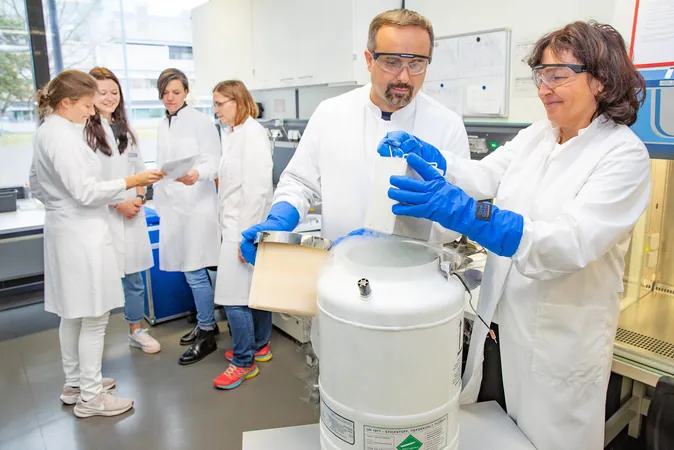
Breakthrough Therapy Using Donor T Cells Halts Life-Threatening Inflammation in Rare Brain Infection
2024-11-25
Author: John Tan
In an astonishing development, researchers have unveiled a groundbreaking therapy that utilizes donor T cells to combat the deadly brain infection known as Progressive Multifocal Leukoencephalopathy (PML). This rare but aggressive disease, which is rapidly fatal in many cases, is caused by the human polyomavirus 2, also referred to as the John Cunningham (JC) virus.
PML dismantles brain tissue progressively, typically resulting in death within weeks once symptoms manifest. However, researchers at the Hannover Medical School (MHH), under the leadership of Professor Dr. Thomas Skripuletz, have pioneered an innovative treatment that effectively halts the virus's progression. In a revolutionary approach, they are now using immune cells from healthy individuals who have previously been infected with the JC virus. These cells, known as DIAVIS T cells, are specifically designed to target and suppress the virus in patients' bodies.
The DIAVIS T cells are derived from the blood of donors, processed at the Institute for Transfusion Medicine and Transplant Engineering, and can be prepared for therapy within a remarkable 24-hour timeframe. Their efficacy has been validated through a scientific evaluation involving 28 patients, where the overwhelming majority exhibited positive responses to the treatment. “We found that the majority of our patients recover from their symptoms and survive the viral infection thanks to this therapy,” stated Professor Skripuletz, whose findings are published in the esteemed JAMA Neurology journal.
Understanding the Silent Infection
Interestingly, the JC virus affects a staggering 70% to 90% of the global population, often without any noticeable symptoms. Once contracted, the virus's genetic material remains dormant in the body. However, under conditions of a weakened immune system—whether due to serious illnesses or immunosuppressive treatments—the virus can mutate. This mutation allows it to infiltrate the central nervous system, leading to PML.
Historically, patients undergoing immunosuppressive therapies had minimal options; the prevailing method was to halt their medication. However, the introduction of the DIAVIS T cell treatment has prompted patients from both Germany and abroad to seek this option at MHH.
A Unique T-Cell Donor Registry
To facilitate the efficient transfer of DIAVIS T cells, there is a crucial requirement for a tissue match: donor cells must align with the recipient’s tissue markers by at least 50%. T cells generally originate from either family donors or the specialized T cell donor registry known as alloCELL at MHH. Immunologist Professor Dr. Britta Eiz-Vesper explains, “At our registry, we not only catalogue HLA characteristics but also assess the availability of specific T cells aimed at various viruses.”
The MHH's reputation as one of Germany's leading centers for producing virus-specific T cells enables researchers to swiftly identify eligible donors for T cell donations. Given the low dosing needed for PML treatment, there is a reduced risk of complications, such as graft-versus-host disease, where donor cells attack the recipient's body.
Future Implications: Beyond PML
To solidify these promising findings, the team is preparing to conduct a phase 2 clinical trial. Should the clinical studies validate the treatment’s effectiveness, it could lead to widespread adoption as a certified therapy for PML, potentially benefiting a larger number of patients than previously recognized.
As Professor Skripuletz notes, PML is often overlooked by healthcare providers, largely due to the absence of effective treatments in the past. However, the methods developed by the MHH research team could also extend to other viral disorders affecting the nervous system. “Our conviction is that this approach will transform the landscape of infectious disease treatment,” he asserts.
Stay tuned as this revolutionary therapy reshapes the way we view and manage rare viral infections!




 Brasil (PT)
Brasil (PT)
 Canada (EN)
Canada (EN)
 Chile (ES)
Chile (ES)
 España (ES)
España (ES)
 France (FR)
France (FR)
 Hong Kong (EN)
Hong Kong (EN)
 Italia (IT)
Italia (IT)
 日本 (JA)
日本 (JA)
 Magyarország (HU)
Magyarország (HU)
 Norge (NO)
Norge (NO)
 Polska (PL)
Polska (PL)
 Schweiz (DE)
Schweiz (DE)
 Singapore (EN)
Singapore (EN)
 Sverige (SV)
Sverige (SV)
 Suomi (FI)
Suomi (FI)
 Türkiye (TR)
Türkiye (TR)